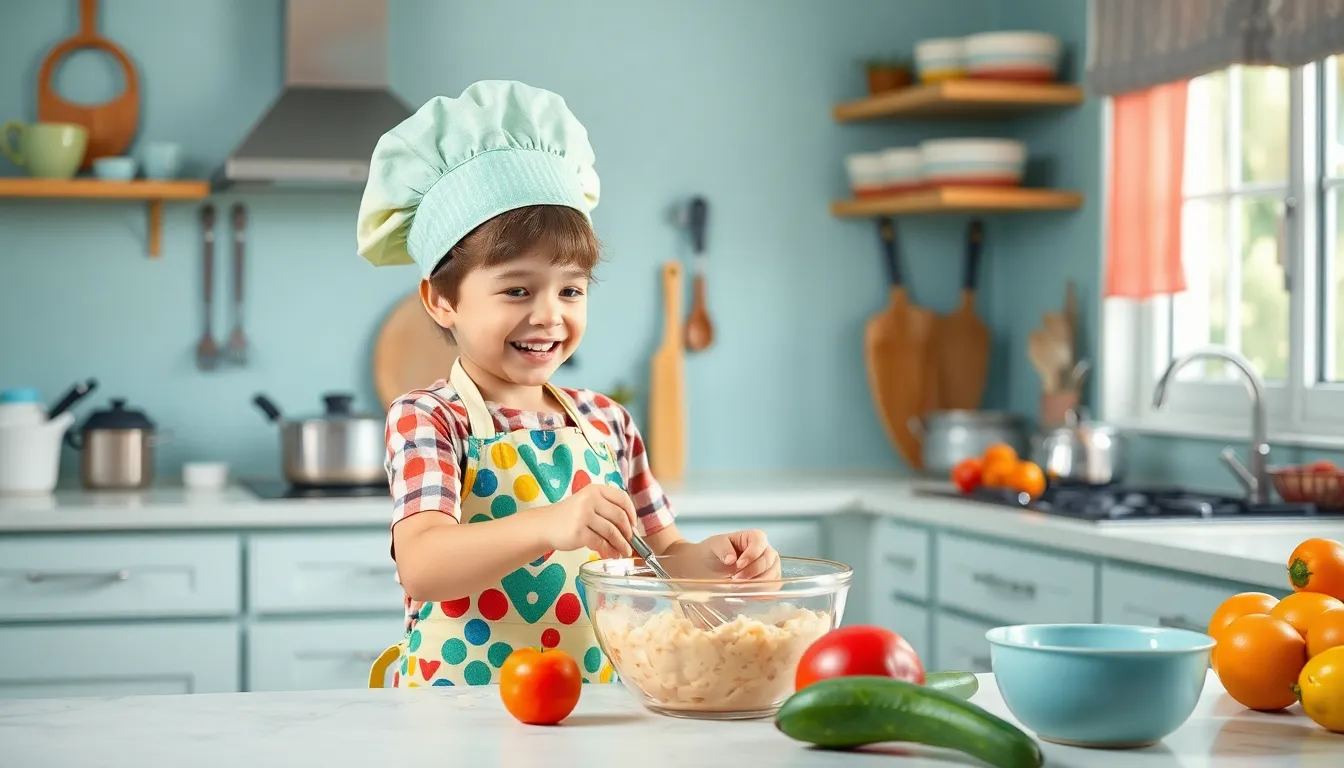Cooking can be a delightful adventure for kids, transforming the kitchen into their very own culinary playground. Imagine the excitement of tiny hands stirring, mixing, and creating delicious masterpieces. Not only do these cooking experiences spark creativity, but they also build confidence and essential life skills. Who knew that making a mess could be so much fun?
Table of Contents
ToggleBenefits Of Cooking For Kids
Cooking offers numerous benefits for kids, enhancing their growth and development. Engaging in this hands-on activity cultivates valuable skills and boosts self-esteem.
Skill Development
Cooking introduces children to various skills that extend beyond the kitchen. They learn to measure ingredients accurately and follow recipes with sequential steps. Understanding concepts like time management and organization emerges as they prep meals. Problem-solving becomes crucial when they encounter unexpected challenges, like substituting ingredients. Additionally, cooking encourages exploration of basic math and science principles, laying the groundwork for lifelong learning.
Confidence Building
Confidence flourishes as kids create their culinary masterpieces. Completing a recipe provides a sense of accomplishment, reinforcing their belief in their abilities. Positive feedback from family members boosts their self-esteem further, promoting a can-do attitude. They develop a willingness to try new things, both in cooking and other areas of life. Over time, these experiences help nurture independence, fostering self-reliance in their decisions and actions.
Easy Things For Kids To Cook

Kids can explore cooking with simple and fun recipes. Engaging them in the kitchen boosts confidence and fosters creativity.
Breakfast Ideas
Pancakes represent a classic breakfast choice for kids. They can easily measure and mix flour, baking powder, and milk. Scrambled eggs offer another quick option, requiring minimal ingredients like eggs, butter, and salt. Toasting bread topped with peanut butter or jam encourages creativity with spreads. Fruit salads serve as an excellent way to incorporate healthy options, letting children choose their favorite fruits. Each recipe helps kids practice various kitchen skills while enjoying tasty results.
Lunch Options
Wraps provide a fun way for kids to assemble their lunches. Utilizing tortillas, kids can add ingredients like turkey, cheese, and fresh vegetables. Mini pizzas allow kids to customize with toppings such as sauce, cheese, and pepperoni. Preparing salads introduces kids to washing and chopping ingredients, while also teaching them about nutrition. Quesadillas represent a quick meal that requires melting cheese between tortillas, creating a delicious treat. These lunch options encourage kids to experiment while developing their culinary skills.
Sweet Treats
No-bake cookies offer a simple, mess-free option for kids. Combining oats, peanut butter, and chocolate creates a sweet snack without any cooking. Fruit skewers provide a colorful, healthy dessert by letting kids thread fruits onto sticks. Banana muffins invite kids to measure ingredients like bananas, flour, and sugar, offering an engaging activity. Rice cereal treats require melting butter and marshmallows, followed by mixing in crispy rice. Each sweet treat cultivates a love for cooking while satisfying their sweet cravings.
Tips For Successful Cooking With Kids
Cooking together becomes more enjoyable with a few simple tips that ensure a positive experience for both kids and adults.
Safety First
Prioritize safety in the kitchen by establishing ground rules. Adults should supervise all cooking activities, especially when using sharp utensils and hot appliances. Teach kids proper handwashing techniques to maintain hygiene. Demonstrating safe handling of knives and hot surfaces builds awareness. Keep a first aid kit accessible in case of minor injuries. Using child-friendly gadgets, such as plastic knives, makes the cooking process safer. Encouraging kids to ask questions about safety enhances their understanding and confidence.
Engaging Them In The Process
Involve kids in every step of the cooking process to boost their interest. Let them choose recipes, fostering a sense of ownership in their dishes. Assign age-appropriate tasks, such as washing vegetables or stirring mixtures, to build skills. Discuss each ingredient’s purpose while cooking, promoting learning. Compliment their efforts to reinforce positive experiences. Sharing stories about family recipes sparks excitement and connection. Emphasizing teamwork allows kids to feel valued while creating together.
Fun Cooking Activities
Engaging in fun cooking activities creates memorable experiences. Children enjoy unique themes and friendly competition, which adds excitement to their culinary adventures.
Themed Cooking Days
Themed cooking days encourage creativity. Selecting themes, like Italian Night or Taco Tuesday, allows kids to explore different cuisines. Kids can make homemade pizzas or assemble colorful tacos, practicing their slicing and dicing skills. Themed playlists or decorations add to the atmosphere, making the experience enjoyable. Preparing dishes collectively nurtures teamwork and sparks discussions about various cultures. Families can share their favorite recipes related to the theme, emphasizing traditions while cooking together.
Cooking Contests
Cooking contests spice up kitchen activities. Children thrive when competing to create the best dish, whether a salad toss or dessert decorating challenge. Setting categories like “Most Creative” or “Best Presentation” helps engage everyone’s imagination. Judges can be family members or friends, providing constructive feedback. Kids develop skills, such as presentation and flavor balancing, while enjoying the thrill of competition. Offering prizes, like a fun cooking gadget, boosts motivation and adds to the excitement of the contest. Friendly rivalry transforms cooking into a lively and educational experience.
Cooking offers kids a fantastic opportunity to explore their creativity while gaining essential life skills. The kitchen becomes a space for experimentation and learning where they can develop confidence and independence. With simple recipes and engaging activities, children can discover the joy of cooking and the satisfaction that comes from creating something delicious.
By involving kids in the cooking process and encouraging them to try new recipes, parents can help nurture a lifelong love for culinary arts. These experiences not only enhance their skills but also create cherished memories that families will treasure for years to come. Embracing cooking together can lead to a healthier lifestyle and stronger family bonds.




